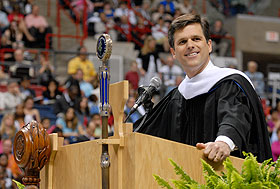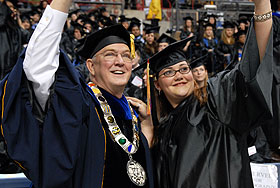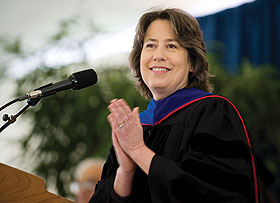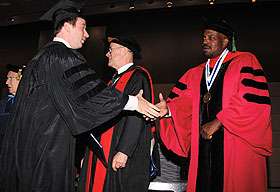  |
| HOME | THIS ISSUE | CALENDAR | GRANTS | BACK ISSUES | < BACK | NEXT > |
Fulfill your own dreams, Shriver tells graduates by Colin Poitras, Sherry Fisher,
Michael Kirk, & Chris DeFrancesco - May 21, 2009 |
||||||||
| As a member of the prominent Kennedy family and chairman of the international Special Olympics serving 2.5 million athletes in more than 165 countries, Timothy Shriver knows something about the pressures of meeting other people’s expectations. His advice to students during dual undergraduate commencement exercises May 10: don’t allow others to dictate your future.
“Don’t try to live up to someone else’s expectations no matter how much you love them or respect them,” Shriver told students from the College of Liberal Arts and Sciences in Harry A. Gampel Pavilion. “Don’t try to fulfill their dreams. “It is time, graduates, for you to define your own expectations of success,” he said, “and to think through what you really want, what you really believe is the answer to your biggest questions.” With this year’s graduating class entering a world struggling for both prosperity and purpose, Shriver encouraged students not to let their need for financial security define their quest. “To reduce your life’s mission to a paycheck is an insult,” said Shriver, who earned a doctorate in special education from UConn in 1997. “It’s an insult to your intelligence. It’s an insult to your education. It’s an insult to your potential, and it’s an insult to your spirit.” Although the students had taken thousands of hours of classes and hundreds of exams in their lifetime, Shriver urged them to take one more course. “The syllabus is your life,” he said. “There is no final except the one you won’t attend. Every sunrise is a quiz. Every person is a reading. Every moment of loss is an invitation to come in and see the professor. Every moment of triumph is also an invitation to come in and see the professor. Ask why does it matter? Are triumph and disaster really that different? Do you know why you are here? Will that ‘why’ guide you through it?”
President Michael Hogan also encouraged graduates to extend themselves beyond their careers despite the difficult economic times. Quoting Sir Winston Churchill, he said, “We make a living by what we get, we make a life by what we give. “So get into the habit of giving until you can support your favorite worthy cause with your pocketbook. Volunteer your time to it,” Hogan said. “Share the gifts you’ve been given with others. And remember, the three things we crave most in life – happiness, freedom, and peace of mind – are all best obtained by giving them to others.” While Hogan kept his audience laughing with comical allusions to the new college staples – pizza, Facebook, and tattoos – he ended his address on a serious note, asking students to create two ongoing “life lists.” One, he said, should be titled, “This Is What Matters To Me.” The other, “How I Spend My Time.” “Make it your ambition to align the first list with the second list,” Hogan advised the students. “Make your time matter.” Shriver received an honorary Doctor of Human Letters degree during the ceremony, and Jeremy Teitelbaum, dean of the College of Liberal Arts and Sciences, presented four faculty members with awards for excellence in research. Those recognized were Mary Burke (English); Donald Les (ecology & evolutionary biology); James Rusling (chemistry); and Stephen Ross (economics). Additional Commencement ceremonies were held in Storrs during the weekend May 9-10 for the Schools of Business, Education, Engineering, Fine Arts, Nursing, and Pharmacy, the College of Agriculture and Natural Resources, and the Center for Continuing Studies. Additionally, the Army and Air Force ROTC programs held commissioning ceremonies. Graduate ceremony “It’s about applying your knowledge and skills, over the short and long terms, toward a common good, through the infusion of positive and ethical values,” Sternberg told master’s and doctoral students and their families during the graduate Commencement ceremony in Gampel Pavilion on May 9. “Wise people – Nelson Mandela, Martin Luther King, Mother Teresa, and others apply what they know not only to help themselves, but also to help others and the world,” he said. “The crisis in the world today was created, in part, by people with high IQs and great educations,” Sternberg said. “How could such smart people go wrong? The reason is that it is possible to be smart and foolish at the same time.” He said it is difficult to be wise, because people are susceptible to certain cognitive fallacies of thinking that lead them – no matter how smart they are – to think foolishly. These are the false belief in one’s omniscience, omnipotence, invulnerability, and a false sense of ethical disengagement. “Smart people, glorying in their success, may start to act as though the whole world revolves around them,” Sternberg said. “In doing so, they often set themselves up for downfall, as happened to Dennis Kozlowski, the former CEO of Tyco, who spent company money extravagantly on himself and his wife as though company resources were to be tapped as his own personal piggy bank.” He said smart people often find themselves in positions of substantial power, lose sight of the limitations of their power, and start to act as though they are omnipotent: “Several U.S. presidents as well as presidents of other countries have had this problem, leading their countries to disaster on the basis of personal whims.” Sternberg received an honorary doctorate of science during the ceremony. Also recognized were Board of Trustees Distinguished Professors Gregory Anderson, (ecology and evolutionary biology), Diane Burgess, (pharmaceutical sciences), and Diane Lillo-Martin (linguistics).
Law School “There are glimmers of hope that we’re moving beyond the financial crisis that triggered the recession,” said Bair, chairman of the Federal Deposit Insurance Corporation. “We’re past the panic phase we saw last fall, and we’re now in the clean up phase.” She said that as the banks are repaired, and lending - especially for housing - gets back to more normal patterns, the economy and the job market will start to improve, though she said the process would probably take a year. “But take heart,” said Bair. “Be patient. I know we’ll dig out of this. And you’ll find that job, that opportunity you’re seeking, and put your education to good use.” Bair spoke of challenges she faced in her own life and gave graduates three lessons she said she has learned: be determined and look at having the “freedom to fail” as an asset; take risks in life – though be wise about them; and find balance between things like career and family and between the quest for financial success and happiness. “When the economy gets healthy again, I hope for a new ‘back-to-basics society, she said. “A new ‘old world’ where banks and other lenders promote real growth and long-term value, where your generation rediscovers the peace of mind of financial security that comes from thinking before spending, cutting up the credit cards, and maybe even living at home for a year to save some money to pay off student loans.” When it comes to achieving happiness in life, said Bair, “the people who seem happiest to me are those who follow their hearts, who are determined to do great things but are not afraid to fail once in a while and who take some risks and find balance in their lives.”
Schools of Medicine
and Dental Medicine The Commencement ceremony was held May 17 at the Connecticut Convention Center in Hartford. “Being prepared for change will be more important for you and your peers than it has been for anyone involved in health care over the last hundred years,” said Batchelder, chief executive officer of Genomic Healthcare Strategies, and a graduate of UConn’s School of Dental Medicine. The UConn Health Center awarded degrees to 76 medical doctors, 40 dentists, 52 master’s degree candidates, and 24 doctors of philosophy. “I am both envious and optimistic,” Batchelder said. “While you have been handed a future with many problems, there are also many opportunities. I think you’ve been armed with education and areas of focus that will allow you to have useful and important roles in that future.” Medical student speaker Chandrika Gardner conceded that the future comes with uneasiness, but offered hope and reassurance. “We’re finally getting to do the work we’ve been training for and wanting to do for the past four years, and for a lot of us, this is what we’ve wanted to do for our entire lives,” she said. Dental student speaker Brian Bell encouraged a confident approach to the next stage in the graduates’ careers. “Although it’s important that we fully subscribe to the philosophy of being lifelong learners, we must not forget all we’ve learned here in our time at UConn,” Bell said. Graduate student speaker David Blair urged graduates to “not forget how instrumental this institution was to our growth as doctors, researchers and policymakers,” and urged them to be advocates for continued funding and support for the University. |
| ADVANCE HOME UCONN HOME |




